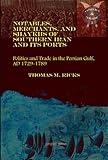Notables, Merchants, and Shaykhs of Southern Iran and Its Ports : Politics and Trade in the Persian Gulf, AD 1729-1789 / Thomas M. Ricks.
Material type: TextSeries: Conflict and TradePublisher: Piscataway, NJ : Gorgias Press, [2012]Copyright date: ©2012Description: 1 online resource (342 p.)Content type:
TextSeries: Conflict and TradePublisher: Piscataway, NJ : Gorgias Press, [2012]Copyright date: ©2012Description: 1 online resource (342 p.)Content type: - 9781593339579
- 9781463216405
- 950
- online - DeGruyter
| Item type | Current library | Call number | URL | Status | Notes | Barcode | |
|---|---|---|---|---|---|---|---|
 eBook
eBook
|
Biblioteca "Angelicum" Pont. Univ. S.Tommaso d'Aquino Nuvola online | online - DeGruyter (Browse shelf(Opens below)) | Online access | Not for loan (Accesso limitato) | Accesso per gli utenti autorizzati / Access for authorized users | (dgr)9781463216405 |
Frontmatter -- TABLE OF CONTENTS -- LIST OF MAPS -- LIST OF TABLES -- ABBREVIATIONS -- ACKNOWLEDGEMENTS -- PREFACE -- INTRODUCTION – IRAN AND ITS 18TH CENTURY HISTORIOGRAPHY -- CHAPTER I – POLITICAL AND SOCIOECONOMIC STRUCTURES OF LATE-SAFAVID IRAN, SOUTHERN IRAN, AND THE GULF: THE SAFAVIDS, AFGHANS, AND AFSHARS, 1700–1745 -- CHAPTER II – ECONOMIC WARS AND POLITICAL ALLIANCES IN SOUTHERN IRAN AND THE GULF: THE PERIOD OF THE AFSHAR SUCCESSORS OF NADER SHAH, 1745–1750 -- CHAPTER III – TRADE WARS AND POLITICS OF THE NOTABLES, MERCHANTS, AND SHAYKHS IN SOUTHERN IRAN AND THE IRANIAN GULF LITTORAL: THE RISE OF KARIM KHAN AND THE ZAND FAMILY, 1750–1753 -- CHAPTER IV – SOCIAL ALLIANCES AND POLITICAL WARS IN SOUTHERN IRAN: CONSOLIDATION OF ZAND RULE, 1753–1763 -- CHAPTER V – ALLIANCES AND TRADE WARS IN THE GULF: THE ZANDS OF SOUTHERN IRAN AND THEIR ENTRY INTO GULF POLITICS, 1763–1765 -- CONCLUSION -- APPENDICES -- MAPS -- GLOSSARY: THE FOLLOWING DESCRIPTIONS OF OFFICES AND DEFINITIONS OF TERMS RELATED TO 18THCENTURY IRAN -- BIBLIOGRAPHY
restricted access online access with authorization star
http://purl.org/coar/access_right/c_16ec
This book investigates the socio-cultural and maritime history of 18th century – early 19th-century Southern Iran and the Persian Gulf in terms of the merchants, mariners and captains who lived and died in the turbulent waters of the western Indian Ocean. This “uncertain frontier” between a revitalized Ottoman Empire to the west and an emergant British India to the east became a testing grounds for the communities of the Gulf. Generally assumed to be a period of anarchy, the 18th-century maritime peoples resolved differences by marriage, forged alliances, and adapted their mercantile skills to the emerging age of global power.
Mode of access: Internet via World Wide Web.
In English.
Description based on online resource; title from PDF title page (publisher's Web site, viewed 01. Dez 2022)


